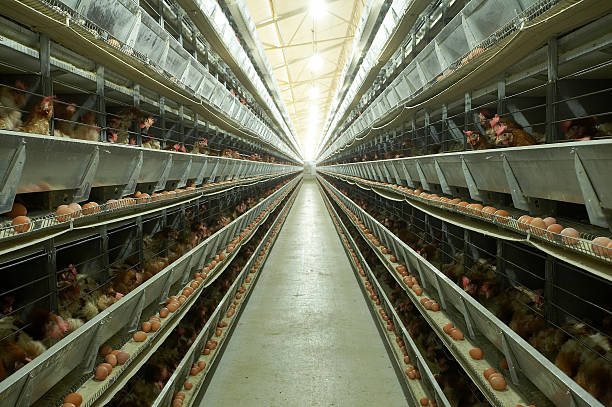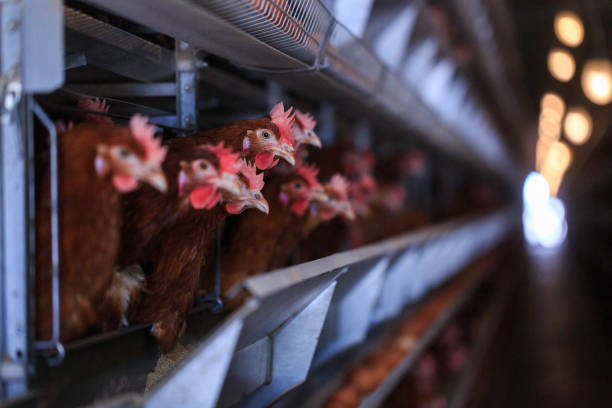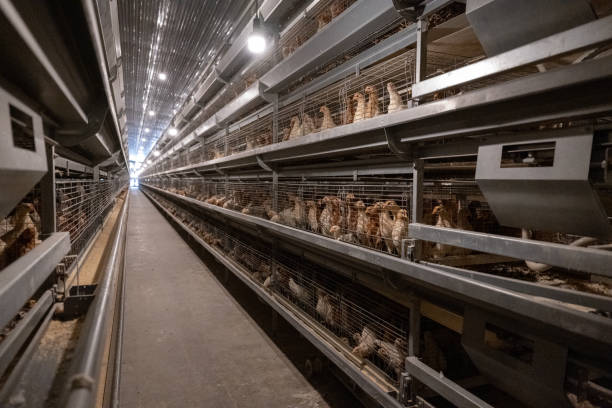Cost-Effective Battery Cage Solutions: Planning Your Poultry Farming Business for Success
Embarking on a poultry farming venture, especially in regions like Africa where the demand for affordable protein is steadily rising, requires meticulous planning. One of the most crucial decisions a poultry farmer must make is the housing system for their birds. While various options exist, battery cage systems have emerged as a leading choice, particularly for egg-laying hens and broiler chickens, due to their numerous advantages. However, success hinges not just on choosing battery cages but on understanding how to implement cost-effective solutions that align with your business goals. This article delves into the intricacies of planning your poultry farming business for success with affordable battery cage systems, specifically tailored for the African context.
Understanding the Allure of Battery Cage Systems in Poultry Farming
Before diving into cost efficiency, it’s essential to understand why battery cages have become so popular in modern poultry farming. Battery cages, typically arranged in rows and tiers, offer several compelling benefits.
Firstly, they maximize space utilization. In areas where land is scarce or expensive, battery cages allow you to house a significant number of birds in a relatively small footprint. This can significantly reduce land acquisition costs, a major barrier to entry for many aspiring poultry farmers.
Secondly, battery cages contribute to improved hygiene and disease control. By separating birds, the spread of diseases is minimized. The wire mesh floors allow droppings to fall through, reducing the birds’ contact with their waste and minimizing the risk of disease outbreaks. This leads to healthier birds, lower mortality rates, and reduced veterinary expenses.
Thirdly, battery cages facilitate easier management and monitoring. Farmers can easily observe individual birds, identify potential health problems early on, and provide targeted care. Egg collection is also simplified, reducing labor costs and improving efficiency.
Finally, battery cages can lead to increased egg production. The controlled environment within the cages, combined with optimized feeding and watering systems, can create an ideal environment for hens to lay more eggs.
Crafting a Cost-Effective Business Plan: Key Considerations
While battery cages offer numerous advantages, the initial investment can be a significant hurdle. This is where careful planning and cost-effective solutions become paramount.
Market Research and Demand Analysis:
The first step in any successful business venture is thorough market research. Understand the demand for eggs or broiler meat in your local market. Identify your target customers, their preferences, and their purchasing power. This will help you determine the scale of your operation, the type of birds to raise, and the appropriate type of battery cage system to invest in.
Choosing the Right Battery Cage System:
Battery cages come in various designs and sizes. The choice depends on the type of birds you plan to raise (layers or broilers), the number of birds you intend to house, and your budget. Consider the following factors:
Cage Material and Durability: Opt for high-quality, corrosion-resistant materials like galvanized steel. While cheaper options may be tempting, they are likely to have a shorter lifespan and require more frequent replacements, ultimately increasing your costs in the long run.
Cage Size and Configuration: Ensure the cage size is adequate for the number of birds you intend to house. Overcrowding can lead to stress, reduced productivity, and increased disease susceptibility.
Automation Level: Battery cages can be manual, semi-automatic, or fully automatic. Automatic systems, which include automatic feeding, drinking, and egg collection, can reduce labor costs and improve efficiency. However, they also require a higher initial investment. Carefully weigh the costs and benefits to determine the level of automation that is appropriate for your budget and operational needs.
Supplier Selection: Choose a reputable and reliable poultry equipment supplier. Look for suppliers who offer high-quality cages at competitive prices, provide excellent after-sales support, and have experience in serving the African market. Consider importing directly from manufacturers like Livi Machinery to potentially reduce costs.

Financing Your Poultry Farm:
Starting a poultry farm requires significant capital. Explore various financing options, including:
Personal Savings: Using your own savings is the most straightforward way to finance your business.
Loans from Banks and Microfinance Institutions: Many banks and microfinance institutions offer loans specifically for agricultural businesses. Prepare a detailed business plan and demonstrate your ability to repay the loan.
Government Grants and Subsidies: Some governments offer grants and subsidies to support poultry farmers. Research available programs and determine if you are eligible.
Partnerships and Investments: Consider partnering with other individuals or organizations to pool resources and share the risks and rewards of the business.
Optimizing Feed Management:

Feed is the largest expense in poultry farming. Efficient feed management is crucial for profitability.
Choose a High-Quality Feed: Select a feed that is specifically formulated for the age and type of birds you are raising. Ensure the feed contains all the necessary nutrients for optimal growth and egg production.
Minimize Feed Wastage: Use appropriate feeders that prevent feed spillage. Regularly check and maintain the feeders to ensure they are functioning properly.
Consider Local Feed Sources: Explore the possibility of sourcing feed ingredients locally to reduce transportation costs.
Implement a Feed Management System: Track feed consumption and adjust the feed ration as needed to optimize feed efficiency.
Water Management:
Clean and accessible water is essential for poultry health and productivity.
Ensure a Reliable Water Source: Secure a consistent and reliable water source.
Install an Efficient Watering System: Use nipple drinkers or other efficient watering systems that minimize water wastage.
Regularly Clean and Maintain the Watering System: Prevent the buildup of bacteria and algae in the watering system.
Waste Management:
Proper waste management is crucial for maintaining hygiene and preventing environmental pollution.
Install a Manure Removal System: Consider using a manure removal system to efficiently remove droppings from the cages.
Explore Manure Recycling Options: Manure can be used as fertilizer for crops or as a source of biogas. Explore these options to generate additional income and reduce waste disposal costs.
Disease Prevention and Control:
Disease outbreaks can decimate your flock and wipe out your profits.
Implement a Strict Biosecurity Program: Implement strict biosecurity measures to prevent the introduction and spread of diseases. This includes restricting access to the farm, disinfecting all equipment, and quarantining new birds.
Vaccinate Your Birds: Follow a vaccination program recommended by a veterinarian.
Regularly Monitor Your Birds: Regularly monitor your birds for signs of disease and seek veterinary assistance immediately if any problems are detected.
Energy Efficiency:
Energy costs can be significant, especially if you are using automated systems.
Optimize Ventilation: Ensure proper ventilation to maintain a comfortable environment for the birds and reduce the need for artificial heating or cooling.
Use Energy-Efficient Lighting: Use LED lights or other energy-efficient lighting options.
Consider Renewable Energy Sources: Explore the possibility of using solar power or other renewable energy sources to reduce your reliance on grid electricity.
Labor Management:
Labor costs can be a significant expense, especially if you are operating a large-scale farm.
Optimize Labor Efficiency: Streamline your operations to minimize the amount of labor required.
Train Your Workers: Provide your workers with adequate training on poultry management practices.

Consider Incentive Programs: Implement incentive programs to motivate your workers and improve productivity.
Sourcing Battery Cages from Livi Machinery: A Cost-Effective Option
For poultry farmers in Africa looking for reliable and cost-effective battery cage solutions, Livi Machinery offers a compelling option. As a leading manufacturer and exporter of poultry equipment, Livi Machinery provides a wide range of battery cages designed for both egg-laying hens and broiler chickens.
Advantages of Choosing Livi Machinery:
High-Quality Products: Livi Machinery uses high-quality materials and advanced manufacturing techniques to ensure that their cages are durable and long-lasting.
Competitive Prices: By importing directly from Livi Machinery, you can eliminate the costs associated with intermediaries and potentially save a significant amount of money.
Customization Options: Livi Machinery offers customization options to meet your specific needs and requirements.
Excellent After-Sales Support: Livi Machinery provides excellent after-sales support, including installation assistance, training, and technical support.
Experience in the African Market: Livi Machinery has extensive experience in serving the African market and understands the unique challenges and opportunities that poultry farmers face in the region.
Conclusion: A Pathway to Poultry Farming Success
Building a successful poultry farming business with cost-effective battery cage systems requires a well-thought-out plan, a commitment to efficient management practices, and a strategic approach to sourcing equipment and supplies. By conducting thorough market research, choosing the right battery cage system, securing financing, optimizing feed and water management, implementing robust disease prevention measures, and exploring opportunities to reduce energy and labor costs, you can increase your profitability and achieve long-term success. Partnering with a reliable supplier like Livi Machinery can provide you with the high-quality, cost-effective equipment and support you need to thrive in the competitive poultry farming landscape of Africa. Embrace innovation, adapt to changing market conditions, and continuously strive to improve your operations to build a sustainable and profitable poultry farming business. Remember that success in poultry farming isn’t just about raising chickens; it’s about building a robust and well-managed business.






